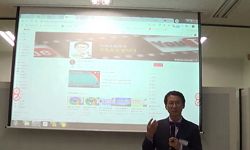Erich Fromm wrote that the stimulation of the conference on Zen Buddhism and subsequent thinking led him to a considerable enlargement and revision of his ideas. Those referred not only to his understanding of Zen, but also to certain psychoanalytic c...
http://chineseinput.net/에서 pinyin(병음)방식으로 중국어를 변환할 수 있습니다.
변환된 중국어를 복사하여 사용하시면 됩니다.
- 中文 을 입력하시려면 zhongwen을 입력하시고 space를누르시면됩니다.
- 北京 을 입력하시려면 beijing을 입력하시고 space를 누르시면 됩니다.
선불교(禪佛敎)의 깨달음에 관한 E. Fromm의 견해(見解)에 대한 분석심리학적(分析心理學的) 비판(批判) = Criticism on the E. Fromm`s views on the Enlightenment in Zen Buddhism from the Viewpoints of Analytical Psychology
한글로보기https://www.riss.kr/link?id=A82510756
- 저자
- 발행기관
- 학술지명
- 권호사항
-
발행연도
2009
-
작성언어
-
-
주제어
선불교 ; 깨달음 ; 불성 ; 프롬 ; 융 ; E. Fromm ; C.G. Jung ; Enlightenment ; Buddha Nature ; Zen Buddhism
-
KDC
100
-
자료형태
학술저널
-
수록면
103-131(29쪽)
- 제공처
-
0
상세조회 -
0
다운로드
부가정보
다국어 초록 (Multilingual Abstract)
Erich Fromm wrote that the stimulation of the conference on Zen Buddhism and subsequent thinking led him to a considerable enlargement and revision of his ideas. Those referred not only to his understanding of Zen, but also to certain psychoanalytic concepts, such as the problems of what constitutes the unconscious, of the transformation of the unconscious into consciousness, and of the goal of psychoanalytic therapy. So impressed though he was with Zen Buddhism which was introduced from D. T. Suzuki, he tried to understand the enlightenment in Zen Buddhism from his existing psychoanalytical perspective with the result that he could not understand the enlightenment in Zen Buddhism correctly. If a psychoanalyst tries to understand Zen Buddhism only by his psychoanalytical knowledge or experience, he could not encounter with Zen Buddhism beyond the territory of the Psychoanalysis from the very beginning. Therefore, the psychoanalyst to understand Zen Buddhism, first he has to leave his values of Psychoanalysis and study how to understand the mind in Zen Buddhism. And I think that the psychoanalyst is needed to practice Zen actually to understand Zen Buddhism correctly. Only then mistakes in translating Zen Buddhism into psychoanalytical language will be minimized. E. Fromm followed the Freud`s aim that was the knowledge of reality and the domination of irrational and unconscious passions by reason. Their aim differs entirely with the basic Zen teachings such as Nonattachment to Language(不立文字), Pointing Directly to Mind(直指人心), See Your Nature, Become Buddha(見性成佛). These teachings express how the practice of Zen is not dependent on understanding, or on knowledge of books and that Zen practice points directly to our minds so that we attain our true nature. On the contrary of rationalistic attitude of E. Fromm, C. G. Jung was of opinion that in civilized man the rationalism of consciousness, otherwise so useful to him, proves to be most formidable obstacle to the frictionless transformation of psychic energy. And he insisted that reason is only a means to an end, a symbolical expression for a transitional stage in the path of development. E. Fromm also wrote that a strengthening of the ego is an aim of Freudian psychoanalysis. But such an aim violates one of the most basic teachings of Buddha, All dharmas are without ego-nature(諸法無我). From the standpoint of Analytical Psychology, ego-strengthening is also considered a necessary process in the path of Self-actualization. Therefore E. Fromm`s attitude can not be accepted entirely wrong. But I point that he insisted a strengthening of the ego as a final one not as a transitional process. And E. Fromm insists that consciousness is of a higher value than unconsciousness. But when we consider alaya-vijnana of Yogacara(瑜伽行派) to be located in the unconsciousness, it is a Buddhistic standpoint that the center of the mind is in the unconsciousness where Buddha Nature as alaya-vijnana is located. So his opinion violates the teachings of Buddhism. However, under the influence of Zen Buddhism, E. Fromm thinks that there is something like Buddha Nature in the unconsciousness of everyone, unlike Freud who sees the unconsciousness negative only. Therefore it seems obvious that he became closer to the Zen Buddhism than Freud. But, he continues to insist that the aim of psychoanalysis is that of making the unconscious conscious at the same time he admits the Whole man is in the unconsciousness. This shows that there is an inevitable limitation in his understanding of Zen Buddhism because he does not have an insight into Non-ego(無我). However, the E. Fromm`s aim that is the total experience of the whole man and the full recovery of unconsciousness by consciousness is not entirely incorrect and have some aspect acceptable at the standpoint of Analytical Psychology. But it is so only if the whole man is considered as a shadow of the personal unconsciousness, not as a Buddha Nature. In Analytical Psychology, making the personal unconsciousness conscious is called the integration of a shadow. The integration of a shadow is a very difficult task throughout one`s life. But this is only an ego-centered process. It is possible that some Zen practitioner mistakes this integration of a shadow for an attainment of enlightenment. However, this is only the first step of Self-actualization, the ultimate aim of Analytical Psychology. Self-actualization means becoming the whole of the psyche including the collective unconsciousness. It is the Self archetype that makes the individual become the whole of his psyche beyond ego. The Self archetype is a priori when everyone is born and could be compared with Buddha Nature which makes us enlightened with insight into Non-ego. C. G. Jung warned that human arrogance could bring us the enormous tragedy when we want to integrate the contents of the collective unconsciousness into consciousness like E. Fromm. The Self is a construct that serves to express an unknowable essence which we cannot grasp as such, since by definition it transcends our powers of comprehension. Thus, it is obvious that the ego can not be a subject of understanding the Self of the collective unconsciousness and making it conscious. Therefore, it is the fundamental difference from E. Fromm`s views that C. G. Jung recognized the subject of enlightenment in Zen Buddhism is not ego but Buddha Nature that could be compared with the Self of Analytical Psychology.
동일학술지(권/호) 다른 논문
-
- 한국분석심리학회
- ( Hansueli F. Etter )
- 2009
-
- 한국분석심리학회
- 김계희 ( Kye Hee Kim )
- 2009
-
- 한국분석심리학회
- 김성민 ( Seong Minne Kim )
- 2009




 KISS
KISS






